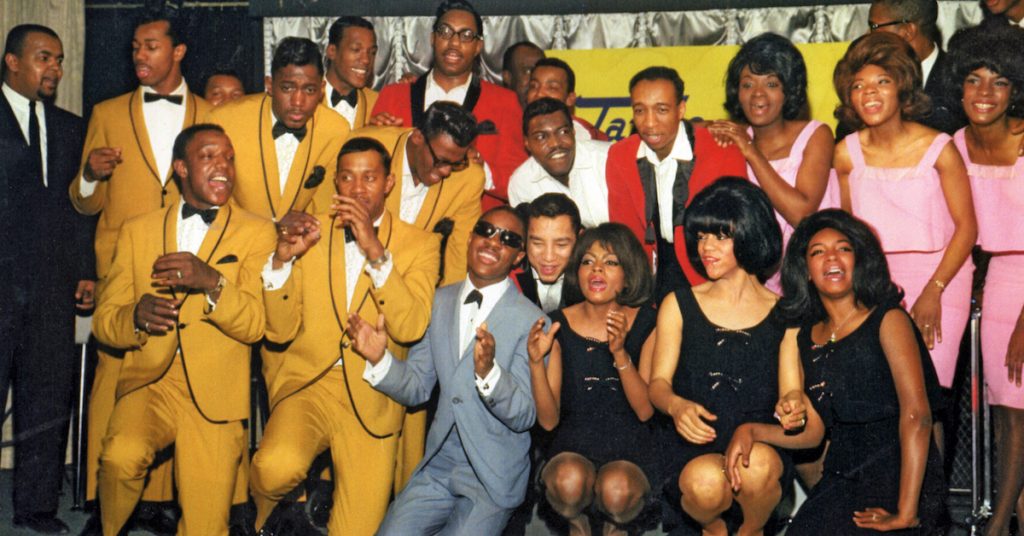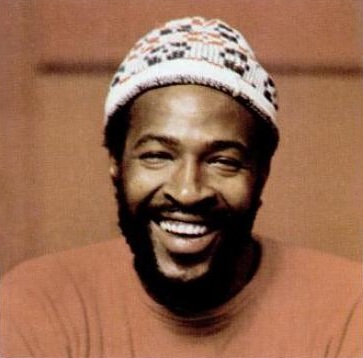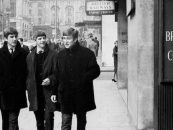
The Temptations, The Miracles, Stevie Wonder, Martha & the Vandellas and The Supremes at EMI Records in March 1965, for the U.K. launch of the Tamla-Motown label.
(Photo courtesy of the Paul Nixon Collection)
There’s never been another record company quite like Motown. From its inception, in 1960, the label was run like a well-oiled machine, replete with artist development classes and lessons in fashion and choreography. Comprising a close-knit, multi-purpose collective of writers, producers, artists and in-house studio musicians, the label was a model of self-sufficiency and discipline.
Not surprisingly, that all-for-one, one-for-all philosophy extended, in many instances, to the treasure trove of songs composed by the company’s staff of writers. While virtually all of Motown’s best-known songs have come to be associated with one particular artist, it was by no means unusual, during the company’s heyday, for a second (or third or fourth) Motown artist to cover the work of another. Below, in no particular order, are 10 noteworthy instances in which a Motown classic received (at minimum) the double-dip treatment.
“Ain’t No Mountain High Enough”
Marvin Gaye and Tammi Terrell (1967)
Diana Ross (1970)
This Motown classic, written by Nickolas Ashford and Valerie Simpson, is notable in part for gaining the legendary songwriting couple entry into Motown’s stable of writers. Released in 1967, the original Marvin Gaye/Tammi Terrell version testified to the duo’s brilliant vocal chemistry, a fact that’s especially remarkable given that Gaye’s and Terrell’s vocals were recorded separately, days apart. Three years later Ashford and Simpson urged Diana Ross to record a solo version. Ross was at first apprehensive, but eventually agreed to craft a rendition that bore gospel overtones. The result? A #1hit on both the pop and R&B charts, plus a Grammy nomination for Best Female Pop Vocal Performance.
“Get Ready”
The Temptations (1966)
Rare Earth (1969)
Written by Smokey Robinson, this buoyant anthem became a live staple for two Motown acts. The Temptations’ version, released in 1966, squeaked into the top 30 on the U.S. pop charts. Rare Earth’s rendition fared even better. As the band’s first studio recording for Motown, “Get Ready” took up a full side of their debut album for the label, clocking in at more than 21 minutes. A three-minute edited version, released as a single in February 1970, reached #4 on the pop charts and #20 on its R&B counterpart.
“Papa Was a Rollin’ Stone”
The Undisputed Truth (1972)
The Temptations (1972)
Even R&B experts sometimes forget that this Motown epic was originally written for and recorded by the Undisputed Truth. That band’s version dented the charts, but it was the Temptations’ rendition, released later that same year, that went on to become an enduring soul classic. For years, rumors abounded that singer Dennis Edwards loathed the line citing September 3 as “the day that [Papa] died,” the supposed reason being that Edwards’ father indeed passed away on that day. In truth, however, the lyric was a non-issue, as Edwards’ father had died on October 3. Released in September 1972, the Temptations’ single was split into two parts, with a “vocal” version on the A-side, and an instrumental version on the B-side.
“My World is Empty Without You”
The Supremes (1966)
Smokey Robinson and The Miracles (1969)
Motown’s in-house songwriting team of Holland-Dozier-Holland wrote a trove of #1 hits for the Supremes, but ironically, this song, one of the group’s best-known, failed to nail the top spot. Peaking at #5 on the pop charts and holding that spot for two weeks, the single went on to become one of Motown’s most-covered tracks. On Four in Blue, their final album of the ’60s, Smokey Robinson and the Miracles elected to close out the LP with their own rendition, ratcheting down the tempo a notch and imbuing the track with a more dramatic, haunting tone than the Supremes’ version.
“I Heard It Through the Grapevine”
Gladys Knight & The Pips (1967)
Marvin Gaye (1968)
This towering Motown classic has its roots in songwriter/producer Norman Whitfield’s desire to craft a song that would “outfunk” Aretha Franklin’s “Respect.” The song has a complicated history. Gladys Knight and the Pips recorded their version after both the Miracles and Marvin Gaye had recorded theirs, but the Knight version was the first to be released as a single. Despite getting little support from the label, the Knight version became Motown’s best-selling single to that point. Still, it was Gaye’s recording that took radio by storm. Released in October 1968, Gaye’s electrifying rendition topped the pop singles chart for seven weeks. Today, “I Heard It Through the Grapevine” is regarded as one of Motown’s most important contributions to American music.
“Smiling Faces Sometimes”
The Temptations (1971)
The Undisputed Truth (1971)
Penned by Norman Whitfield and Barrett Strong, this 1971 R&B classic was written specifically for the Temptations. An edited version of the group’s 12-minute recording was slated for release as their summer single, but those plans were scrapped when lead vocalist Eddie Kendricks quit the group to begin a solo career. Undaunted, producer Whitfield re-recorded the song with Motown protégés the Undisputed Truth, creating a version that bore a more sinister tone than the Temptations’ rendition. The Undisputed Truth single proved a smash success, topping out at #3 on the Billboard Hot 100 chart.
“My Cherie Amour”
Stevie Wonder (1969)
The Jackson Five (1969)
Originally called “Oh, My Marsha,” this composition was written by Stevie Wonder in 1967 as an ode to his girlfriend. By the time recording began, however, “Marsha” was no longer in the picture—hence, the change in title. Some of the lyrical content was revised as well, with Wonder getting help from fellow Motown writers Henry Cosby and Sylvia Moy. First released in 1969, initially as a B-side, Wonder’s version topped out that summer at #4 on both the R&B and pop charts. Later that year, the Jackson Five’s debut album hit record stores, with their rendition kicking off side two. Fifteen-year-old Jermaine Jackson handled the lead vocal, imbuing the song with a romantic tone that nearly matched that of Wonder.
“Reflections”
Diana Ross and the Supremes (1967)
The Four Tops (1970)
Released during the 1967 “Summer of Love,” this Motown classic was one of the last Supremes hits written by the Motown production team of Holland-Dozier-Holland. Often cited as Motown’s entry into psychedelic pop, the track featured oscillator-generated sound effects that have often been mistaken for a Moog synthesizer. The release fell one spot short of becoming the Supremes’ 11th #1 pop single, settling into the #2 slot behind Bobbie Gentry’s “Ode to Billie Joe.” Three years later, the Four Tops included a brassy, dramatic rendition on their Still Waters Run Deep album.
“For Once in My Life”
Barbara McNair (1966)
Stevie Wonder (1968)
“For Once in My Life” has a convoluted history, but it appears that the first Motown artist to record the song was ’60s starlet Barbara McNair. Arranged and recorded as an orchestral ballad, McNair’s version was included on her 1966 album, Here I Am, and also released as the B-side of a 45. The Four Tops and (more famously) the Temptations recorded the song as well, but it was Stevie Wonder’s upbeat rendition, released in October 1968, that became the definitive version. Wonder’s recording climbed to #2 on both the R&B and pop charts. The song that blocked it from the top spot? Marvin Gaye’s “I Heard it Through the Grapevine.”
“War”
The Temptations (1970)
Edwin Starr (1970)
A Norman Whitfield/Barrett Strong composition, “War” was an unabashed, emphatic protest song—a rarity for the Motown label. College students and activists sent letters to the company, requesting that the Temptations’ version be released as a single, but fears that the track’s strident theme would alienate conservative fans nixed that proposal. Instead, Whitfield recorded a new arrangement with singer Edwin Starr, who gave the song a blistering intensity that left no doubt about the sentiments expressed in the lyrics. The Starr version topped the pop singles chart for three weeks, going on to become one of the most popular protest songs ever recorded.
Related: The Motown world was captured in a stunning 400-page book
- Singing Rock Drummers: From the Skins to the Mike - 03/02/2025
- Rod Stewart & Friends: 10 Great Collaborations - 01/10/2025
- Band on the Run: The LP That ‘Saved’ McCartney - 12/05/2024







3 Comments so far
Jump into a conversationGreat list of some of the old Motown tunes that was pivotal in my growing up in the Sixties and Seventies, living and growing up in Detroit at the time was so much fun with tunes like these to make music a major part of my life.
Even back in the day, though Gladys Knight’s “Grapevine” was a hit before Marvin Gaye’s, I knew that the Marvin version (or some male version) must have been the original. Otherwise there wouldn’t have been the difference in the lines “Take a good look at these tears of mine” in the former and “I know a man ain’t supposed to cry” in the latter. If the song had originally been written for a woman, there would have been no reason to change that gender-neutral line when it was sung by a man.
Motown (Berry Gordy) was famous for allowing his artist stable to cover each others songs. If only to fill in an album to make a dozen, but sometimes it really worked. Take, Shake Me Wake Me Four Tops/Supremes, Who’s Loving You Miracles/Jackson5, What Love Has Joined Together Mary Wells/Temptations, just a few. I know all were not released as a single, but they were cover versions by multiple Motown artist.